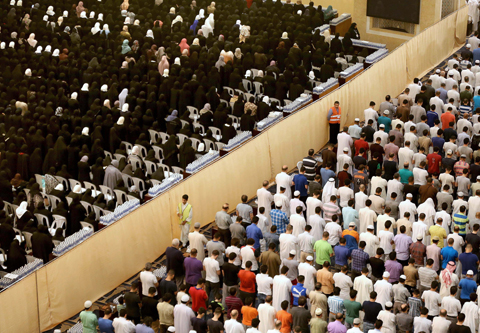 Worshippers pray at the Grand Mosque in Kuwait City early yesterday. — Photo by Yasser Al-Zayyat
Worshippers pray at the Grand Mosque in Kuwait City early yesterday. — Photo by Yasser Al-ZayyatThousands of worshippers thronged the Grand Mosque early yesterday to spend the night of the 27th of Ramadan in prayer and supplication. But the number of attendees was fewer than in previous years, possibly due to tightened security measures, construction works and multiple layers of checks. Worshippers had to pass through metal detectors and undergo body pat downs before entering the mosque. Streets surrounding the mosque were cordoned off, and unlike previous years, praying on the streets surrounding the mosque was banned.
As on other nights, eight rakaats of tahajjud were performed, followed by three rakaats of witr. The first four rakaats were led by Sheikh Ahmad Al-Nafees, and the remaining by Sheikh Meshari Al-Afasy. In the interval, Sheikh Ahmad Al-Qattan delivered a short sermon, extolling the virtues of memorizing the Holy Quran and urging the Arab and Muslim nation to stay united.
The Grand Mosque in Kuwait is the hub of worship in Kuwait in Ramadan, and thousands pack its cavernous interiors throughout Ramadan. Many believe 'Laylatul Qadr' (Night of Power or Decree) falls on night of the 27th of Ramadan, but this is not a confirmed fact as Prophet Muhammad (PBUH) instructed Muslims to hunt for this night on the odd-numbered nights of the last ten days of Ramadan. Qiyam ul-layl or special nightly prayers are therefore held during these nights at the Grand Mosque and many other mosques across Kuwait.
Laylatul Qadr holds great significance for Muslims, and the last ten nights of Ramadan are spent in prayer and meditation. Ubaadah bin Saamit (RA) reports that he asked the Prophet (PBUH) about Laylatul Qadr. He replied: "It is in Ramadan, during the last ten days, on the unevenly numbered nights, either the 21st 23rd, 25th, 27th, 29th or the last night of Ramadan. Whosoever stands in 'ibaadah' (worship) on this night, with sincere faith and with genuine hopes of gaining reward, his previous sins will be forgiven. Among the signs of this night is that it is a serene, quiet, shining night, neither hot, nor cold but temperate as if a moon is shining clear, and no meteors are shot at the devils on that night; it lasts until the break of the dawn. Another sign is that at morn, the sun rises without any radiant beams of light, appearing rather like the moon in its fullness. On that day, Allah prohibits the devils from rising up with the sun."
Laylatul Qadr could thus fall on any night, but the night of the 27th is believed by most to be the one, and millions of Muslims around the globe spend this night in prayer. The Holy Quran says that Laylatul Qadr is better than a thousand months, and Allah's blessings and angels descend on earth on this night. Laylatul Qadr is also the night that Allah first sent down the first verses of the Holy Quran via Archangel Gabriel to Prophet Muhammad (PBUH).
By Shakir Reshamwala










